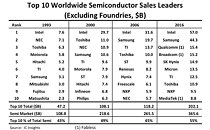Wednesday, May 3rd 2017

Samsung Could Become Top Chipmaker in 2Q17, Dethrone Intel
Samsung could be on the verge of a historic dethroning of Intel as the dominant chipmaker in the IC world, if a recent report from IC Insights is to be believed. The report shows Samsung actually exceeding Intel's semiconductor sales in 2Q 2017, no doubt spurred on by mobile market growth and the proliferation of ARM based SOCs manufactured by Samsung.
Intel has held the dominant position for nearly a quarter century as its x86 architecture powered most PCs and notebooks/netbooks since 1993. The number of components they sell is not just limited to CPUs either: Intel is a provider of chips for everything from networking to thermal sensors, for Samsung to compete with such a giant in the semiconductor market at all (let alone exceed their sales) is quite a feat indeed.IC Insights also notes that Samsung's sales are benefiting majorly from the recent increase in NAND/DRAM prices, which it expects to "cool" (drop) later this year. If true, this may be a temporary crown for Samsung, but regardless, it is quite an achievement for the South Korean Electronics group.
The report itself may be accessed in the source link.
Source:
IC Insights
Intel has held the dominant position for nearly a quarter century as its x86 architecture powered most PCs and notebooks/netbooks since 1993. The number of components they sell is not just limited to CPUs either: Intel is a provider of chips for everything from networking to thermal sensors, for Samsung to compete with such a giant in the semiconductor market at all (let alone exceed their sales) is quite a feat indeed.IC Insights also notes that Samsung's sales are benefiting majorly from the recent increase in NAND/DRAM prices, which it expects to "cool" (drop) later this year. If true, this may be a temporary crown for Samsung, but regardless, it is quite an achievement for the South Korean Electronics group.
The report itself may be accessed in the source link.


14 Comments on Samsung Could Become Top Chipmaker in 2Q17, Dethrone Intel
Considering Intels market penetration this would indeed be quite the feat for Samsung.
Intels 10nm is like Sammy 7nm.
If intel really wanted to destroy the other companies it could if it wanted to make its own custom ARM chips and FAB them at their process which is always a year a head if not more than the other companies.
The real problem is that Intel may not be sure which direction to go. With negative over-all public reaction to Microsoft products in the past few years, including Windows 10, people are flocking to non-Microsoft mobile platforms as a primary form-factor for daily computing. As a result the PC market is continuing to take a hit. Alternative OS's are gaining a foot hold a lot faster than ever before. And Microsoft is becoming more irrelevant by the day. If this trend continues, and it's showing no signs of slowing down, Intel may have to re-invent itself to adapt. Samsung has no such limitation as it's already in a dominant position in the mobile market.
This is a very uncertain time for Intel and even AMD as they are both losing market share to mobile platforms the world over. And Microsoft is partly to blame because of their very unpopular, unethical and in some places, unlawful privacy violations. People are unwilling to trust Microsoft anymore and they're unwilling to trust anything with the Microsoft/Windows name on it regardless of the brand name on the box. I'm seeing this literally all over the world[at least where I travel].
I've been in this industry since 1980 and have seen all of the ebb and flow of technological trends. Some worked, some didn't. Companies have come and gone. Even the once mighty IBM, who created the PC standard, is no longer around[the PC market]. Very few are. Microsoft has lost touch with it's consumer base. Perhaps they're not irrelevant yet, but if they don't drastically change their business model and get back in touch with market needs, they soon will be. It's only a matter of time, and they already have one foot in the grave, regardless of their profit declarations. IBM and Cryix had record profit years even as they were on the way out.
Sorry, this is reality. You don't have to like it, but it is what it is.
Also if someone can do some digging to see how much taxes are paying Samsung and then compare it to Intel's ;)
Let's not just look at 2016... take it back five years and all you can see is that DESPITE the shaky Windows versions, they're only growing. And not only that, but they are growing during a transitional period that included a change of leadership. Even their worst year of the past five (2015) saw more than double income digits compared to 2002.
I can really understand their strategy.